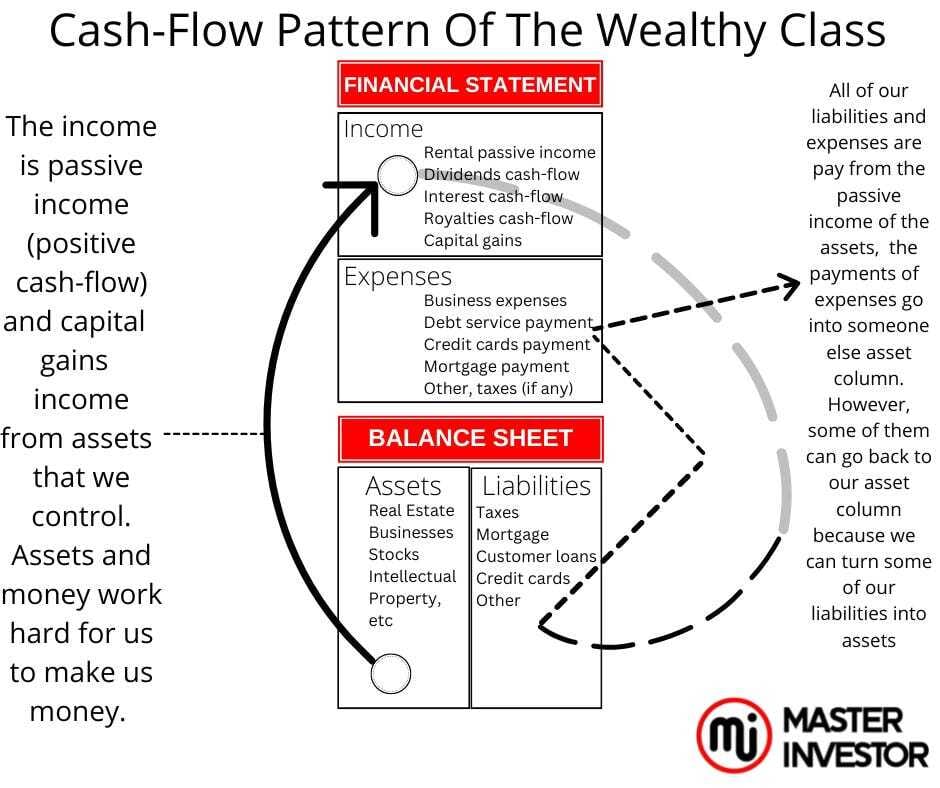Summary:
There are numerous ways to make money: Before we start investing in real estate, make sure we understand the differences.
Making use of these seven real estate tactics can significantly impact our investing portfolio.
Keep in mind that we will need to keep learning new things in order to become a great real estate investor.
At the end of today’s business talk, we will cover our bonus on “why investing in multifamily is superior to 401(k)?” to further understand why actively investing is key to becoming financial free.
Knowing what kind of income we are aiming for is one of the first things people should think about when they start investing in real estate.
Income obtained through employment or other forms of labor is known as earned income.
Income from a portfolio of paper assets, including stocks, bonds, and mutual funds, is known as capital gains income.
Income that can come to us without any particular effort on our part right now and is not dependent on a time or activity is known as passive income (also known as positive cash-flow).
Although there are three different kinds of income, here at masterinvestor we choose to concentrate on passive income, which comes specifically from sound assets.
The most notable example of passive income is real estate
Real estate investment income is the main example of passive income, making up about 80% of this category of income. Real estate is the most predictable source of investment income due to its consistent cash flow, in addition to its ability to generate sizable financial returns that increase over time. It also provides a number of beneficial tax benefits. The good news about investing in real estate is that.
However, the problem is that making money from real estate investments necessitates a lot more planning, practice, and perseverance than other revenue streams.
Only those who genuinely grasp the fundamental techniques and abilities of real estate investing can achieve widespread success, even though many real estate investors can achieve some degree of success.

Here are some real estate investing tactics that experts don't tell us to increase profits.
These seven practical real estate investing techniques will help us make the most money.
Strategy 1: Assemble a top-tier investment group
Attempting to do everything ourselves is a surefire way to limit our growth prospects and our real estate investment returns. Feeling that we must know everything ourselves will significantly impede our progress, but a desire to learn as much as we can in any given field will benefit us throughout our career. Even more harmful is the belief that we must do everything by ourselves.
The truth is that in a field as complicated as real estate investing, no one can know everything there is to know, much less do everything there is to do, even with a great deal of effort. Always seek specific data from successful real estate investors who have been in the business for more than 50 years—like—continue to learn new things with every investment. Tap into new opportunities created by today’s advancement of technology and AI.
As a result of their general lack of knowledge about the real estate investment process, novice investors are frequently overly cautious, conceited (and therefore reckless), or just inexperienced. As a result, they frequently make mistakes one after the other. Furthermore, while making mistakes is perfectly acceptable in theory—in fact, they can be among the best teaching tools—too many mistakes can frequently result in catastrophe in both business and other spheres of life. Experience is the best defense against these catastrophic errors. However, when we are first starting out, how do we gain experience? We accomplish this by taking advantage of other people's experience.
Some novice real estate investors now contend that they will be able to keep a larger portion of their profits if they handle all the work themselves. On the surface, that might be the case, but what these people don't understand is that the right partners can sometimes significantly raise the returns that can be obtained from investment endeavors.
Strategy 2: Make a tax plan.
Generally speaking, no one enjoys talking about taxes, but in the real estate industry, taxes translate into more revenue. As was previously mentioned, investing in real estate has significant tax benefits. Only if we set up our real estate investing activities correctly from the start will we be able to take advantage of these tax benefits. It turns out that a number of provisions in the U.S. tax code were specifically drafted to promote real estate investment and development. The majority, if not all, of the cash flow that our properties produce can be shielded from federal and state taxes thanks to these tax provisions—and even to eliminate some personal income taxes that aren't connected to real estate.
We can deduct a wide range of direct and indirect costs related to managing and maintaining a property, including repairs, utilities, office expenses, property manager salaries, advertising, and the like, because the government views real estate investing as a business. However, we can also write off some large "phantom expenses," such as depreciation, which are expenses that are listed in the property's books but that we don't really have to pay for out of pocket. But we need a lot of information to maximize our tax savings. Regretfully, we probably won't have all the information we require unless we work as a tax or real estate accountant. That's another reason we need a strong team of real estate investors.
In order to optimize our real estate investment returns and legally and legitimately reduce the taxes we owe on these activities, our financial team can assist us in developing a real estate investment tax strategy in advance.
Strategy 3: Make a legal strategy plan.
Making money is easy, but holding onto it requires higher level of financial literacy. One of the most profitable ways to make money is through real estate ownership. However, owning real estate carries some serious risks, just like many other business endeavors. Among the most important of these are legal risks, which can include anything from landlord-tenant relations to failure to fulfill contractual obligations. Therefore, controlling our legal risks will be essential to becoming a profitable real estate investor. Because of these considerations, developing a legal strategy is a necessary addition to developing a real estate tax strategy. However, why is a complex legal strategy necessary? Isn't having a good lawyer and insurance sufficient? Regretfully, no.
Inadequate management of the legal risks associated with real estate investing can result in judgments against us from litigants that drastically lower the value of our assets. In the worst situation, they might even be able to seize our real estate holdings themselves. In rare instances, they might even be able to seize other unrelated assets, such as our personal home or business assets.
Strategy 4: Know our market
In the real estate sector, there is a well-known adage that states that "location, location, location" are the three most crucial elements in assessing a property's worth. However, the significance of a property's location goes beyond apparent considerations like how well-kept an office park is or how run-down a neighborhood is. It's true that location affects a property's value before geography even comes into play. It starts with the intended use of the property.
Successful real estate investors nearly always choose the kind of properties we want to invest in in advance, just as the majority of successful business owners begin our entrepreneurial endeavors knowing what kind of goods or services we want to sell.
One explanation for this is that the locational considerations we should make will depend on the kind of property we are aiming for. The local priorities of families, seniors, students, and other potential renters, for example, are likely to differ significantly if we are looking to rent an apartment. As a result, after deciding on a property type, we should carefully consider all pertinent locational factors, including transportation options, crime and safety, the proximity of schools, shops, and restaurants, population dynamics, zoning laws, property taxes, and many more. These factors will all have an impact on an area's property values for a very long time. For many, questions about job growth are the most crucial ones to ask.
Is it more likely that jobs will be leaving the area or will new ones be coming in? Are the new positions paying more, or do they appear to have the potential to pay less? But even then, we are not finished because fact sheets and statistics can only tell us so much. In order to get a sense of the place, we should also take a personal drive around, just like a potential tenant or buyer might. How long does it take to get to the grocery store, the freeway, or other places of business? How busy or noisy is the neighborhood during the day? How secure is it at night?
Strategy 5: Project our cash flow honestly
After deciding on a type of property and a place to invest, it's time to start researching individual properties. As we proceed, remember that creating positive cash flow is the main reason wee became a real estate investor. Additionally, each property we buy must yield a profit if we want to make the kind of money w desire; otherwise, we are merely squandering our time and limited investment funds. An existing property owner usually creates a financial "pro forma" when attempting to sell a rental property. Both income and expense items are included in pro formas. Since rent typically accounts for a large portion of revenue, we should ensure that the estimated rents are reasonable.
For example, rents for the property we are considering purchasing are unlikely to suddenly increase by 10% annually if they have been rising by 3% annually in the surrounding areas. Alternatively, occupancy rates are unlikely to reach 80% or 90% in the near future if only half of the offices or apartments in the property we are considering have been leased for the previous few years.Similarly, we should consider all of the expenses related to buying and maintaining the property in question. Operating expenses, or the costs associated with managing and maintaining the property, and debt servicing costs, or the interest paid on any loans we took out to purchase the property, usually make up the majority of a rental property's costs.
However, there might be additional unstated expenses. Do the units' flooring and furniture need to be replaced? Do we need to obtain any new permits or adhere to any new government regulations? How long does it usually take for one occupant to vacate and another to move in? And so forth. Many properties will be removed from our list of "potentials" if we honestly evaluate the entire range of income and cost factors. This can be frustrating.
Consider it this way, though: removing properties that are high-risk or low-return will greatly raise the likelihood that the properties that do make the cut will have a good chance of producing a sizable cash flow for many years to come.
Strategy 6: Provide excellent tenant service
New real estate investors frequently only consider the bottom line. As previously mentioned, our primary goal as a real estate investor is to generate profits, so that's to be expected. However, we must be cautious not to overemphasize the importance of money because we want to safeguard both our long-term revenue and our short-term cash flow.
Indeed, as a real estate investor (particularly if we are renting or leasing our properties), we are in a customer-facing business just like the local car-repair shop or the electronics store down the street. Similar to them, we must look out for and satisfy our clients in order to stay in business for very long. This doesn’t mean being extravagant, fitting our apartments with gold-plated faucets or our offices with granite floors. However, it does entail offering residential or commercial space that is tidy, clean, and well-maintained. Additionally, it entails routinely checking our rental properties to avoid issues before they arise and reacting politely and promptly when they do.
If we want our properties to stay fully rented or leased, we will need to budget for the cost of going through all of this trouble, even though it may seem like a lot of needless work and expense. If not, not only will our tenants tell other prospective renters about any bad experiences, and they might even leave if things get bad enough, but with the abundance of online review sites for almost any kind of property these days, one tenant's bad experiences with we can be displayed on a computer screen for every potential new renter to see. We don't even want to consider the possibility that these unpleasant interactions will worsen.
Method 7: Increase in value
One crucial idea that can be a useful tool for real estate investing is taught in the board game Monopoly: four green houses lead to one red hotel. That formula can be use in real life. The majority of real estate investors who stay in the business for even a brief period of time come to the realization that the abundant profits that so many of our peers make are only possible with ever-larger properties. For example, if our only investment property is a starter home in a marginal neighborhood or a $150,000 duplex, it's hard to make significant profits. Trading up is the answer. Moving the cash-flow into more lucrative assets. Through experience we will be able to spot and allocate sound assets.Naturally, trading up entails selling a smaller or less lucrative property, "cashing out," and using the proceeds to buy a larger and more lucrative piece of real estate.
The only catch is this. A "capital gain" is what we get each time we "cash out." Additionally, both the federal government and many state governments tax capital gains income, albeit at a lower rate than regular personal income. With so much of your gain being lost to taxes, how can we make progress? We don't give up the money, is the response. It has nothing to do with concealing income or breaking the law. The government actually encourages we to buy bigger and bigger properties because it creates more, and typically better, commercial and residential space. And they provide us with some strong incentives to do so.
The "1031 exchange" is the most significant of these incentives. The Internal Revenue Service Code section that regulates a particular class of real estate transactions is designated by the number "1031." Simply put, we can roll over the capital gains income from one investment property into another through 1031 exchanges.As our real estate investing business grows, we should use 1031 exchanges and other tax-friendly ways of trading up more often if we want to be a phenomenally successful real estate investor.
Actively invest and learn
The real keys to using real estate investing to become financially secure—even extravagantly wealthy—are the concepts presented here. However, as written, they are merely concepts.
Putting these concepts into practice is the only way they can turn we into a profitable real estate investor. However, we also need to continue learning because the information we have discussed here only scratches the surface of what we need to know to become a successful real estate investor and pursue this as a lifetime career.
Take action now—and continue learning throughout our real life experience , as here at masterinvestor’s we like to convey to our partners. As we do, we will discover that investing in real estate can give us the fantastic base of prosperity and freedom we have always wanted.
Comparing the perspectives of an business owner and an employee
To become wealthy, we myst adopt the wealthy context which is more important than content. Majority of people in the world only think like employees, which is why they don't understand how to create true wealth. Business owners, we are aware that in order to remain competitive, we would have to pay that money to employees in their salaries if 401(k)s didn't exist.
Business owners benefit from a 401(k) because we are not required to pay the funds unless an employee chooses to participate, and they are also exempt from paying if an employee leaves the company too soon because they are not vested. Majority of people will not choose because they simply lack the funds to do it as they struggle with their bad spending habits.
The unpleasant reality of 401(k)s
This is supported by research, which should assist those people who continue to find this reasoning perplexing or unpersuasive.
According to a 2012 study by the Center for Retirement Research, "All else being equal...workers at companies that contributed to their employees' 401(k) accounts tended to have lower salaries than those at companies that gave no retirement contribution," as reported by Steven Gandel of "Time Magazine" in an article titled "How 401(k)s Make Many Americans Poorer."
Indeed, for numerous workers, the pay decrease was approximately equivalent to the magnitude of their employer's possible contribution.In other words, in order to compete with businesses that offer 401(k)s, those that do not have to pay higher salaries.
Instead of having to match it and save it in a tax-deferred retirement plan, where they have no control and incur high fees, those employees of those companies simply receive their money as part of their salary.
When it comes to exorbitant fees, the average 401(k) plan keeps 80 percent of the earnings. If the investor is lucky, they might get 20% of the profits. Is it difficult to believe?
The investor assumes all of the risk and contributes all of the capital. The 401(k) plan assumes no risk and contributes zero percent of the funds. Even if they lose money, the fund still makes money from fees.A 401(k) typically puts 20% of the person’s money in their pocket during a bull market. For example, if they had $10,000 in their 401(k) and it earned 5%, their 401(k) made $500 in profit, but they only received $100 (before taxes.)
With a 401(k), we now need to realize that taxes work against us. The tax rate on long-term capital gains income is reduced to about 15%. Fantastic! The 401(k) treats any gains as regular income, which is the only issue. The highest rate of taxation, up to 35% at times, is applied to ordinary or earned income. Additionally, there will be an extra 10% penalty tax if the person (amateur investor) wishes to withdraw the funds early.
The tax code is designed to work in our favor when it comes to real investment assets, so we won't be taxed everywhere.
Things worsen. According to accurate calculations, inflation rises more quickly than any 401(k) when government ingenuity is absent. That implies that they are losing money!
Ditching the 401(k) to invest with control to retire wealthy
The first step is to commit to investing in financial education. The more we know, the more control we can have over our investments. An essential component of investing is control. As previously stated, a person has no control over their investments with a 401(k) because they typically invest in funds and indexes that are managed by brokers, who in turn are managed by bankers, who in turn manage companies that are managed by boards.
We need to be financially educated and in charge of our finances and investments if we want to be wealthy. Because they have a great deal of control over their investments, investors like masterinvestor’s financial education prefer to make their own business investments, buy real estate, and develop their own products. In general, a good matrix is one in which our potential return increases with our level of control. Our potential return decreases as our level of control decreases.
Naturally, investing in things over which we have control requires a high level of financial intelligence because many crucial decisions must be made. For this reason, most people probably don't mind being forced into a 401(k).
This is due to the fact that the majority of people lack basic financial knowledge and are unsure of how to spend or save their extra cash.
Bonus: Why investing in multifamily is superior to 401(k)?
Keep in mind that 401(k)s are for the benefit of the employer. With a 401(k), a person might be losing more money than they realize. Remember that greater control equals greater return when it comes to business and investing.
Purchasing a modest multi-family building, residing there, and maintaining it for cash flow is a legitimate choice for people who are approaching retirement. We say it was a great time to start investing today in apartments because of low interest rates and low prices. However, we can invest in any economy because we always invest with a winning plan that is made with facts.
Additionally, we note that rents are rising in the majority of states and that renting rather than buying appears to be the long-term trend in the US. This was good news for landlords. Real estate when pick properly is a proven and future proof formula for wealth. As long as the location of the real estate is right, then the real estate will be there forever.
In many cities, rents are still rising rapidly. Furthermore, as we recently established, the 401(k) continues to deprive the majority of people of their retirement funds.Given that the we have been promoting cash-flowing real estate as one of the best investments for years because of its leverage, monthly cash flow, and tax advantages.
Using Other People's Money: It's always preferable to use other people's money to generate cash flow. This is fairly typical in the world of real estate investing. We may only put down 10% of the total cost of a property, with the remaining funds coming from a bank or private individual, and still be making money! Consider this: for just $50,000, we can purchase a $500,000 property that generates more than $5,000 in cash flow each month!
Appreciation is the gradual rise in the property's value: We can raise our rent rates if we can properly maintain our property, look after our tenants, and plan ahead. Our expenses decrease as the rent rises. The property's value rises as a result.
Control: When we own a property, we have authority over its earnings and outlays. Therefore, our property is immune to market fluctuations if we can maintain cash flow from it.
Tax Benefits: Owning real estate properties has certain tax benefits. We are able to deduct depreciation from our revenue as an expense. Not to mention the tax credits that are available if we restore a historic building or provide low-income housing. When considering a tax credit, the amount is taken straight out of our taxes at the end of the year. Finally, deferral of capital gains income taxes. The capital gains income taxes will be deferred if we decide to sell our property and reinvest in another one.
Multifamily investing essentially offers everything that a 401(k) doesn’t. Nevertheless, there are a few factors to take into account that are differ.
Employ a property manager
Why invest the time and effort to rent, manage, and maintain an apartment building when we are purchasing one—especially if we are inexperienced? Who wants to spend their golden years changing locks and repairing toilets?
The ability to account for property management when purchasing an investment property is one of the best things about multifamily investing. Look for a deal that will support professional property management and generate income.
Investing should be our "priority," not management
Finding just one building and taking on the responsibility of managing it seems shortsighted to many investors. Instead, start investing and look for more fantastic offers that we can buy and have handled by a professional.
In our free time, educate ourselves about the market, find better deals, round up investors, and increase the value of our portfolio so we can use it to leverage further deals. That will increase our wealth and give us a reason to live in retirement.
No matter our age, get started now. Investing and business are both team sports, and there is not an age limit as to when anyone can start investing. The younger we start, the better for our financial future. It is legal to learn about business and investing at any age.
It makes sense for people who are getting close to retirement to think about multi-family investing, but it makes even more sense for the young people who are reading this to start investing.
"Youth is wasted on the young," as the saying goes. Don't waste our childhood. Instead, start preparing for the future by paying for our financial education and assembling a collection of assets that will support us and our loved ones when the time comes for us to retire.
Investing has not age to start. Anyone can start investing with control and guidance. When we are young, start small, and as we get older, build big.
Read our financial literacy through eCourses and eBooks. We are releasing new book soon. How to raise capital to build wealth? and How to invest in Real Estate like the wealthy? Find more on our website for additional resources and tools on multi-family investment and management.
Remember that there are five assets classes today. We should invest in all of them with a winning business plan. That is how we thrive during any type of economy. Diversifying among all the asset’s classes is key to hedge for inflation and protect ourselves for a down economy. As a business owner and inside investor, we know that the market goes up, and down. Diversifying among all the assets classes is how we continue to thrive in any type of market.
We must acquire financial education to be able to shift to the wealthy context which that is what makes us wealthy. The 3 E’s of an inside investor are financial education, financial experience and excess of cash-flow (passive income). The key is to master using debt to invest for passive income and creating tax free wealth legally.
Start investing in high quality financial education, by reading our financial eBooks:



Lucrative resources and tools:
Follow us on Instagram.
Listen to our Podcast.
Subscribe to our Newsletter.
Subscribe to our Youtube.
Follow us on Tiktok.
Purchase a business digital Course.
Like our Facebook Page.
Join our Inner Circle.
I am reading: How To Invest In Real Estate For Cash-Flow?
Masterinvestor’s mission is to be the global authentic brand of money, business, and investing that elevates the financial well-being of humanity through high-quality financial education made simple with lucrative opportunities to build passive income, win-win partnerships, and true wealth.
Comment, like, share and follow for more High Quality Financial Education Made Simple.


